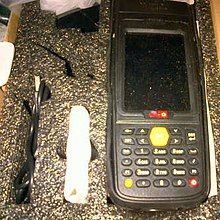INEC card reader

The INEC card reader is a portable electronic voting authentication device configured to read only the Permanent Voter Cards (PVCs) issued by the Independent National Electoral Commission (INEC) in Nigeria.[1] The card reader was designed for the accreditation process (authentication of eligible voters before voting).[2] The machine was configured to read only the PVCs of a particular polling unit and can only work on election day.[3]
Operation
[edit]The device uses a cryptographic technology with an ultra-low power consumption and processing frequency of 1.2 GHz and uses Android 4.0.0[4]
It is positioned by its operators (usually trained INEC officials) to read the embedded chip on the Personal Voter Card (PVC).[clarification needed] This card is placed into the device, which then displays the voter's details. The voter places their thumb on the device, and their identity is confirmed through Fingerprint authentication.[5] It usually takes about 10 to 20 seconds to validate a voter.[6]
On completion of accreditation process, a "Close V" key is used to complete the accreditation process and the total number of voters accredited can be previewed using a "Query" key. Afterwards, the result may be forwarded to INEC using the "Communication" key.[7]
The card reader was first used for Nigeria's presidential election held on March 28, 2015.[8][9]
References
[edit]- ^ "The Card Reader Controversy, Articles - THISDAY LIVE". thisdaylive.com. Archived from the original on 2015-03-29. Retrieved 2015-03-28.
- ^ "INEC Mock poll exposes Card Readers' flaws - Vanguard News". Vanguard News.
- ^ "Mixed Results Trail INEC's Mock Trial of Card Readers, Articles - THISDAY LIVE". thisdaylive.com. Archived from the original on 2015-04-02. Retrieved 2015-03-28.
- ^ Leadership Newspaper (21 March 2015). "Card Reader Is Configured To Work Only On Election Days – Paschal". Nigerian News from Leadership News.
- ^ "Smart Card Reader Configured To Work At Particular Polling Unit - INEC - Channels Television". Channels Television.
- ^ Our Correspondent. "New Telegraph – The constitutionality or otherwise of using electronic card reader in the 2015 general elections (2)". newtelegraphonline.com. Archived from the original on 2015-04-02. Retrieved 2015-03-28.
{{cite web}}:|author=has generic name (help) - ^ Gbade Ogunwale, Assistant Editor, Abuja; Jide Orintunsin Minna; Ogochukwu Anioke, Abakaliki; Kolade Adeyemi, Kano; Austine Tsenzughul, Bauchi; Vincent Ikuomola, Abuja; Nwanosike Onu, Awka; Shola O’Neil and Okungbowa Aiwerie, Asaba; Precious Dikewoha and Rosemary Nwisi, Port Harcourt; Odunayo Ogunmola, Ado-Ekiti; Fanen Ihyongo, Jalingo. "INEC's card readers test-run largely successful nationwide". The Nation.
{{cite web}}:|author=has generic name (help)CS1 maint: multiple names: authors list (link) - ^ "Card Readers: How Abuja court aborted last minute move to stop election". Vanguard News.
- ^ "We support Inec to use card reader". The Punch News. Archived from the original on 2 April 2015. Retrieved 29 March 2015.
